| Official Name: | Republic of Ecuador |
| Official Language: | Spanish |
| Area: | 283,561 km2 (109,484 sq mi) |
| Population: | 17,300,000 |
| Time Zone: | UTC−5 / −6 (ECT / Galapagos) |
| Capital City: | Quito |
| Height (Quito): | 2,850 m (9,350 ft) |
| Currency: | US Dollar |
| Main Cities: | Quito, Guayaquil, Cuenca, Manta |
| Main Port: | Port of Guayaquil |
| Required visa for entry: | Nationals from Canada, EU countries, and the UK and others DO NOT require visas. Click here for more information concerning visa requirements. |
| Required vaccination for entry: | None |
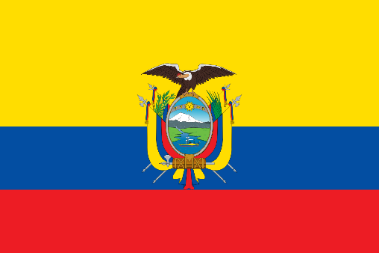
Main Risks:
Theft, robbery, kidnapping, extortion, rape, drug and human trafficking, fraud, vehicle assault, unruly demonstrations.
Executive Summary
Ecuador features intermediate risks chiefly associated with the possibility of suffering armed and unarmed robbery at the hands of common criminals or organized gangs. Security risks increase if itineraries involve road travel through the countryside and/or remote areas. In Quito, it is recommended to avoid travel through southern neighborhoods where security risks are higher. In Guayaquil, it is recommended to avoid travel through areas beyond the city center and the shoreline. Political rallies and events occur regularly throughout Ecuador. It is recommended to avoid the vicinity of any area where demonstrations unfold. Even peaceful ones can rapidly devolve into violence. In case of high-profile travel, we recommend hiring secure transportation or executive protection services, especially if the itinerary requires travel to countryside areas via land routes.
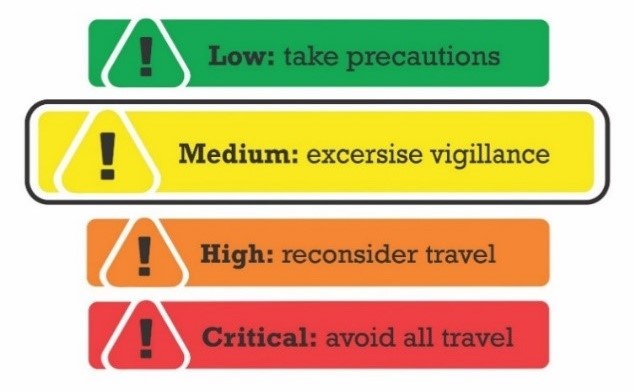
General Risk Level: MEDIUM.
In particular, risks turn critical in the border area with Colombia, where criminal groups and drug traffickers operate. For this reason, it is necessary to plan ahead before traveling to the northern parts of the country, bearing in mind the critical security challenges.
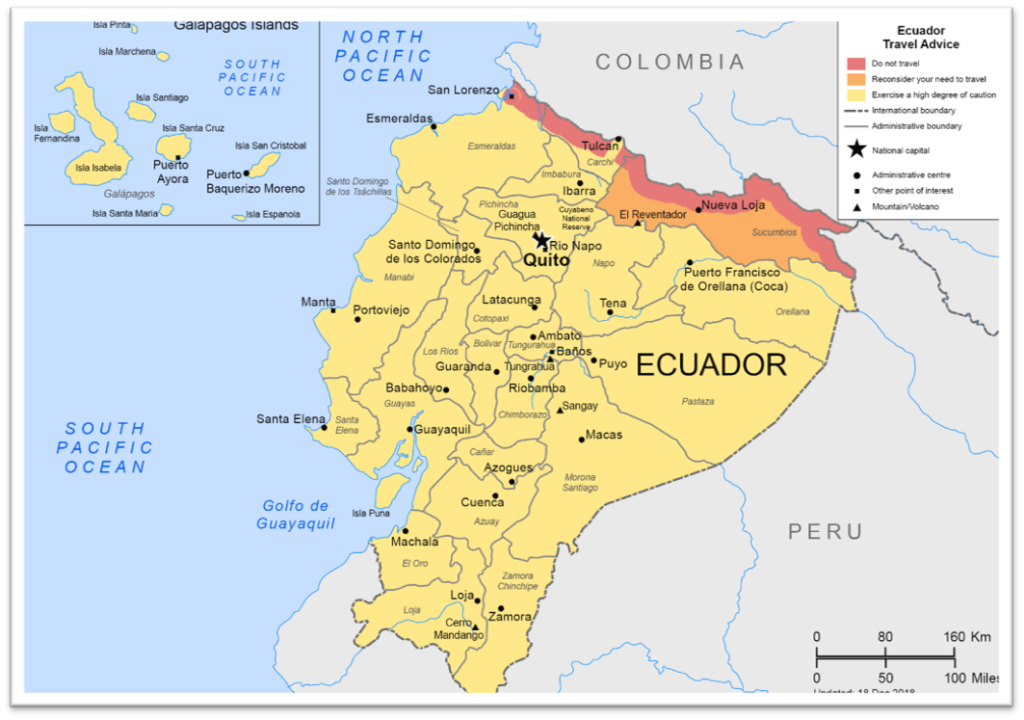
Crime and Security
Similar to what transpires in other Latin American countries, low and medium-level crime represents the main threat to travelers visiting Ecuador. The risk of suffering robbery is higher in the largest urban areas, including Quito and Guayaquil. In these cities, there is a distinct risk of suffering short-term “express” kidnapping. Whether planned or committed at random, criminals seek to force their victims to extract cash from ATMs before being released. Criminals often resort to operating either registered or fake taxis, taking advantage of their victim’s carelessness to transport them to remote areas beyond police control. Foreigners and locals alike are liable to be targeted.
Political rallies and events occur regularly throughout Ecuador. Protesters are known to block city streets and main thoroughfares. Activists occasionally burn ties in order to mount roadblocks and throw stones at security forces. They are also liable to detonate small improvised explosive devices (IEDs). Police response to such challenges varies but generally involves tear gas and water cannons to disperse unruly demonstrators. It is recommended to avoid the vicinity of any area where demonstrations unfold. Even peaceful ones can rapidly devolve into violence.
The national police have a tourist unit deployed in Quito and Guayaquil. While authorities have pledged to increase security presence in sites frequented by foreigners, even the safest areas are prone to witness criminal activity. Apart from low and medium-level crime instances, drug trafficking remains a threat in the country. Traffickers take advantage of Ecuador’s adverse geographic conditions to move and store drugs in sparsely populated areas. The northern frontier area is especially vulnerable to the presence of armed groups. In particular, the Revolutionary Armed Forces of Colombia (FARC) used to dominate drug and mineral trafficking operations along the Ecuadorian-Colombian border.
Although the risk posed by FARC has decreased following the group’s demobilization in the aftermath of the 2016 peace process, rogue elements and other militants from the National Liberation Army (ELN) continue to be present in the region. By operating on both sides of the border, transnational groups are able to withdraw from either side depending on the situation and thus avoid probable engagements with security forces. Given the critical security situation in northern parts of the country, the Ecuatorian army established a 20-kilometer exclusion zone along the Colombian border. The Tulcán land crossing in the Carachi province is the only legal entry point to Colombia from Ecuador. The risk of violent crimes and kidnapping is considerably higher in the north. Moreover, foreign citizens are liable to become attractive targets sought by Colombian factions seeking to gain international notoriety so as to show strength.
Security in Quito
In general, the safest neighborhoods are in the northern parts of the city. The southern areas are more vulnerable to criminal activity. The areas recommended for lodging, travel, and conducting business and transactions are Bellavista, Cumbayá, El Condado, La Carolina (Central Business District – CBD), and San Isidro. These sites are perceivably safer than others because they are better protected by security forces and private security agents. That said, it is recommended to exercise constant vigilance. Even the most privileged sites can witness violent crimes. The Mariscal Sucre International Airport (UIO) in Quito is located in the northeast. The trip between the airport and the commercial district in La Carolina should take between 30 and 60 minutes depending on traffic.
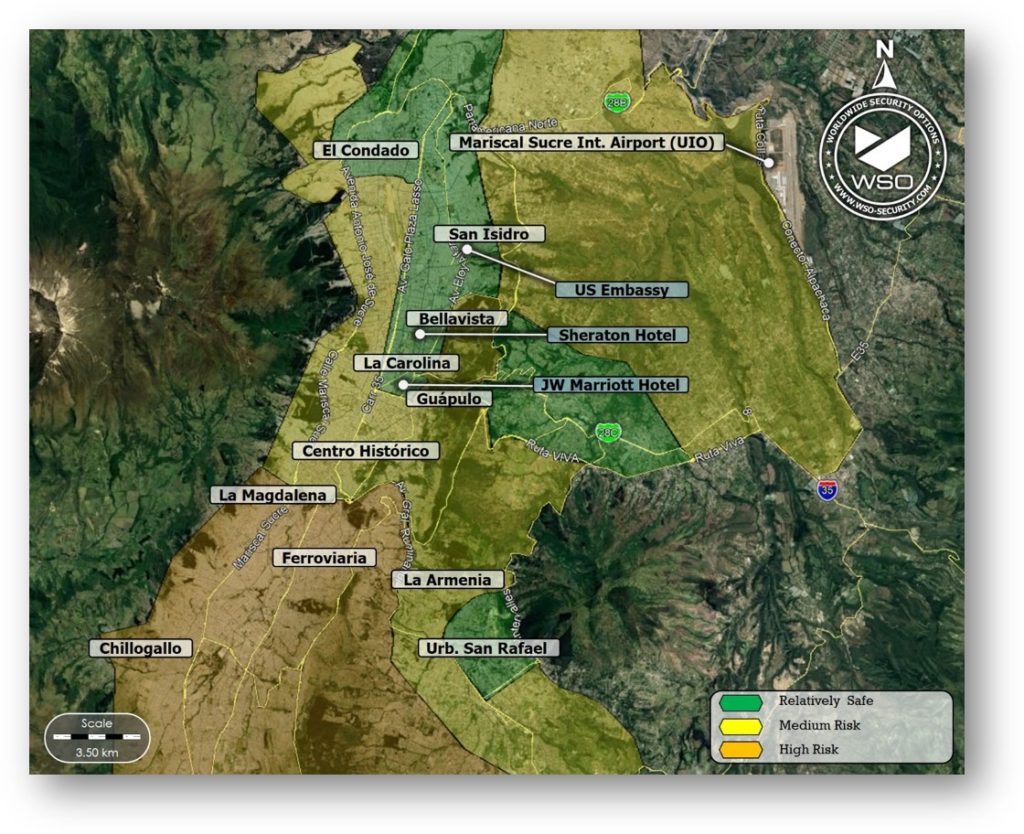
Security in Guayaquil
The safest neighborhoods are located in the vicinity of the José J. de Olmedo (GYE) airport and along the river Guayas shoreline. It is not convenient to travel to the south and western parts of the city. The areas recommended for lodging, travel, and conducting business and transactions are Bellavista, Centenario, Kennedy (Central Business District – CBD), La Bahia, Lomas de Urdesa and Samborondón. For business trips, for security reasons, it is best to lodge in the immediate vicinity of the airport. As it is the case with Quito, even perceivably secure areas are not exempt from suffering criminal episodes.
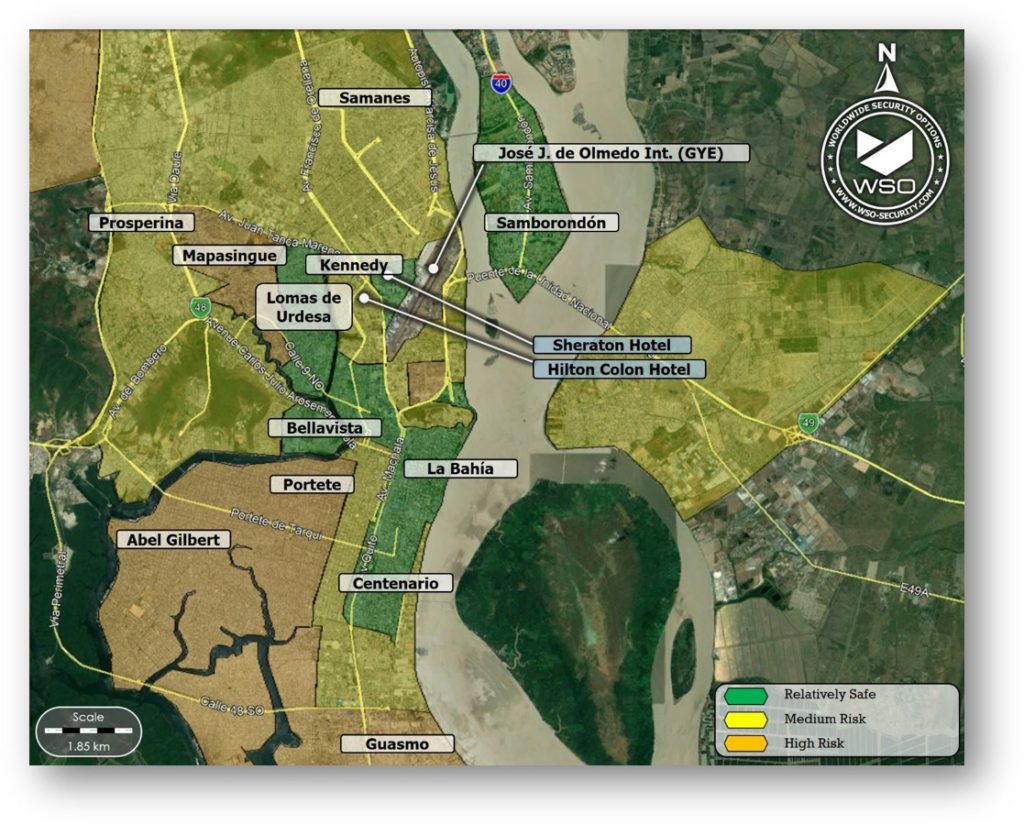
Transportation
For security reasons, we do not recommend using public transportation services in Ecuador. We advise hiring reputable private transportation services in advance. In the event of high-profile visits, it is best to procure private protection services.
The best option to travel between Quito and Guayaquil is to take a commercial flight that lasts approximately one hour. Although land routes are generally in good condition, travel through unpopulated areas with adverse topography entails security risks, especially during the night or under conditions of poor visibility. Therefore, if traveling by land, it is recommended not to deviate from primary thoroughfares or routes, locally called “corredores arteriales”. It is best to avoid secondary routes removed from central localities and which remain in poorer circumstances.
If the itinerary involves travel through relatively remote or sparsely populated areas it is best to plan the route in advance under the supervision of local security professionals. Educated assessments should enable the security contractor to determine the safest route and avoid unilluminated or otherwise dangerous paths.
Health and Sanitary Conditions
Ecuador features changing temperatures and travelers may suffer altitude sickness. Travelers should pay attention to meteorological conditions and avoid touristic trips during the rainy season. It is recommended to wear sunscreen given high exposure to UV rays due to the decrease in the density of the ozone layer on the equatorial strip.
While no proof of vaccination is required for entry into the country, it is recommended to have the following vaccines before traveling: yellow fever, tetanus, hepatitis A and B, and typhoid. It is also necessary to wear protection against bugs and avoid leaving body areas uncovered so as to mitigate the risk of suffering mosquito-borne diseases such as dengue, the Chagas disease, and the zika virus. These precautions must be followed while entering remote and jungle areas. The quality of tap water in Ecuador is relatively high because it comes from the Andes mountains. However, while staying in remote areas it is always best to resort to sealed bottled water. It is not advised to travel without international health insurance covering emergency medical evacuation to the country of origin.
Take essential health precautions to mitigate the risk of contracting diseases or viruses. Carry masks in crowded places such as airports and maintain rules of social distance and avoid contact with surfaces of common use in public places. Always carry hand sanitizer.
Tactical Recommendations
Exercise vigilance and situational awareness throughout the duration of the trip to Ecuador, especially in urban areas vulnerable to low and medium-level criminal activity. Avoid travel to high and critical risk areas. Avoid all travel to the northern border area with Colombia. In Quito, avoid all unnecessary travel to southern neighborhoods. In Guayaquil, remain within central areas.
We recommend hiring private transportation and executive protection services for high-profile trips, especially if travel through the countryside is required.
Avoid carrying large sums of cash or valuables during the trip. We advise against wearing or carrying items in public that may give the impression of economic affluence and which could attract unwanted attention from criminals.
Avoid traveling through the country in sport or luxurious cars which could attract unwanted attention from criminals and corrupt police officers.
Do not resist armed robbery attempts. We recommend to always carry a few 100-dollar bills for duress cases, specifically to appease criminals looking for easy money.
For security reasons avoid travel during night hours, even in Quito and Guayaquil.
We recommend lodging in reputable establishments and hotels with private security. In Quito, it is best to lodge in the north or in the business district of La Carolina. In Guayaquil, it is best to lodge in the vicinity of the airport.
If private transportation services are unavailable, resort to reputable radio taxi companies, provided they are recommended by the best hotels. Stay alert at all times while traveling by taxi to prevent the driver from taking unnecessary detours or from inflating the fare.
If travel by route through the countryside is required, avoid all detours, especially while traveling through sparsely populated rural or jungle zones. If possible, plan routes and stopovers ahead with the support of a local security contractor.
Avoid the vicinity of every kind of political demonstration or rally in urban areas. Peaceful demonstrations are liable to be infiltrated by violent elements.
Take all necessary precautions to mitigate the risk posed by mosquito-borne diseases. Moreover, taking into account the risk of altitude sickness, we recommend consulting a physician before travel to Ecuador takes place.
Emergency Contacts
Police: 101
Ambulance: 911
Fire: 102 (112 from mobile phones)
WSO Global Command Center: +1 956 467 4858 / gcc@wso-security.com
Security advice and assistance over WhatsApp: +593 99 461 1128 / +521 81 1511 3166







